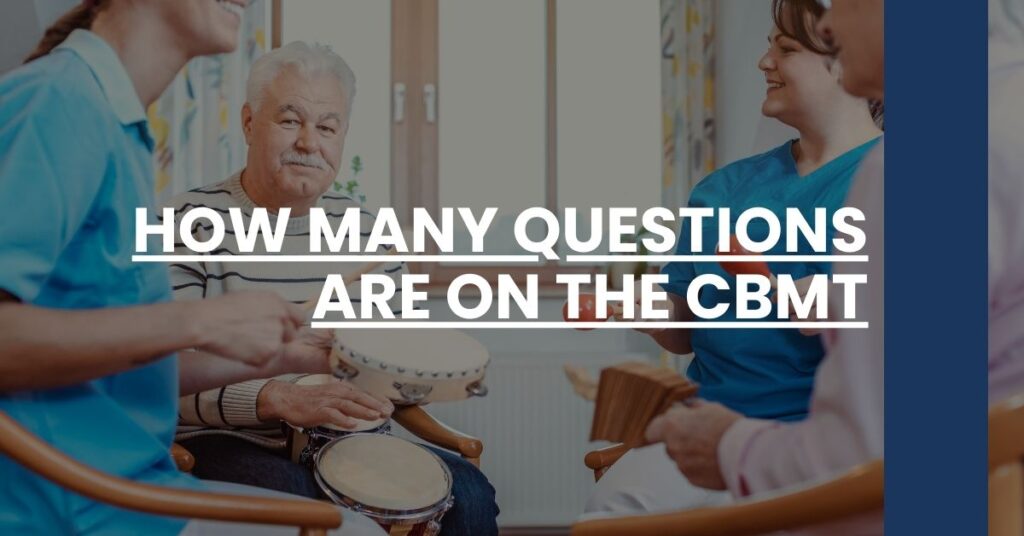The CBMT exam consists of 150 multiple-choice questions, tailored to assess the core knowledge and skills essential for the practice of music therapy. Among these, 130 questions count towards your score, with the remaining 20 serving as non-scored pretest items.
If you’re gearing up to take this crucial step in your music therapy career, here’s what to expect:
- Question Types: All questions are multiple-choice.
- Duration: You have three hours to complete the exam.
- Scoring System: Passing requires correctly answering at least 95 out of the 130 scored questions.
With these details in hand, you’re better positioned to prepare for and pass the CBMT, setting the stage for a rewarding career in music therapy.
- Understanding the CBMT
- Breakdown of the CBMT Exam
- The Number of Questions on the CBMT
- Types of Questions Encountered
- Duration and Scoring of the CBMT
- Preparing for the CBMT Exam
- Changes and Updates to the CBMT Exam Structure
- Importance of Knowing the Question Count
- Where to Find Official CBMT Exam Information
- FAQs About the CBMT Exam
- Conclusion
Understanding the CBMT
When you’re aspiring to become a board-certified music therapist, the Certification Board for Music Therapists (CBMT) represents a crucial milestone on your professional journey. The CBMT is an independent body responsible for certifying music therapists in the United States. They ensure practitioners meet high standards of clinical practice through a rigorous examination process.
Board certification is not merely a credential; it’s a commitment to uphold the therapeutic values and ethical standards that define the profession. It denotes a level of mastery in your knowledge of music therapy practice, theory, and research. The exam itself is more than a mere formality—it’s a comprehensive assessment designed to measure the breadth and depth of your expertise. By tackling the myriad of questions on the CBMT exam, you demonstrate your readiness to engage with clients in a therapeutic setting sensitively and competently.
Understanding the structure and content of the CBMT exam is your first step in preparation. The exam’s blueprint aligns with the scope of music therapy practice, reflected in the various domains that you’ll be tested on. Let’s delve deeper into what the exam consists of and demystify the process so that you can approach it with confidence.
Breakdown of the CBMT Exam
Approaching the CBMT exam, you might be curious about what awaits you. Here, you’ll encounter a well-thought-out test structure that aims to cover all aspects of music therapy knowledge. It’s critical to understand the layout of the exam before we discuss the specifics, including how many questions are on the CBMT.
At a high level, the exam consists of several sections aligned with the professional competencies a music therapist must possess:
- Assessment and Treatment Planning: This section challenges your ability to craft thoughtful, individualized plans based on a client’s needs.
- Implementation and Documentation of Treatment: The questions here test your skills in carrying out the treatment plans and properly documenting progress and outcomes.
- Professional Development and Responsibilities: This part assesses your understanding of the ethical, legal, and business aspects of music therapy practice.
Each domain is integral to your overall competence as a practitioner. You’ll find a variety of scenarios and applications that test your ability to integrate theory into practice effectively.
The Number of Questions on the CBMT
Now, let’s address the key question at hand—the number of questions on the CBMT. Knowing this gives you a tactical advantage in time management and mental preparation. The CBMT exam comprises 150 multiple-choice questions. Out of these, 130 are scored questions which directly contribute to your final mark.
The remaining 20 questions are experimental and do not count toward your score. These are included to test the validity of future exam items, ensuring the CBMT remains a robust and fair assessment tool. While you won’t know which questions are experimental, it’s in your best interest to approach each one with equal seriousness and resolve.
Types of Questions Encountered
As mentioned earlier, the CBMT exam exclusively features multiple-choice questions. But don’t let the seeming simplicity of the format fool you. Each question is crafted to gauge a variety of competencies:
- Knowledge Recall: Some questions will assess basic recall of factual information critical to the practice of music therapy.
- Application: Many questions require you to apply knowledge in practical, sometimes complex, scenarios.
- Critical Thinking: You’ll also encounter questions designed to test your critical thinking skills, challenging you to make judicious decisions based on given situations.
The variety and depth of the questions mean that you’ll need to be well-versed in both music therapy principles and how they apply in real-world contexts.
Duration and Scoring of the CBMT
When it comes to the administration of the exam, know that time is of the essence. You will have three hours to navigate through those 150 questions, a pace which calls for both accuracy and efficiency.
As for scoring, there’s a clear benchmark you’re aiming for—the current passing score is set at 95 out of the 130 scored questions. This means that answering correctly a little over two-thirds of the scored items is needed to achieve certification. While this may sound challenging, effective preparation strategies can equip you to meet and even exceed this threshold.
Now that you have a clearer picture of the CBMT exam’s structure, question types, and scoring, it’s time to shift gears and focus on how you can best prepare for this crucial career step. With the right strategy and resources, you’ll not only conquer the CBMT exam questions but also embark on your music therapy career with a strong foundation of knowledge and expertise.
Preparing for the CBMT Exam
As you approach the CBMT exam, remember that preparation is paramount. Understanding that you’ll face 150 questions, including the crucial 130 that determine your fate, gives you a mental framework to start your study plan. How you prepare can make the difference between a pass and a fail. Here are some strategies to help you tackle the exam confidently:
- Review Core Textbooks: The foundations of any music therapy study plan, core textbooks cover the theoretical principles that form the basis of the exam. Structure your studying around these texts, ensuring you understand the key concepts before moving on to more complex material.
- Practice Tests: Simulate the exam environment with timed practice tests. This will help you get comfortable with the format and pacing of the actual CBMT exam. Correct your practice tests thoroughly to understand your mistakes and learn from them.
- Study Groups: Joining a study group can provide mutual support and help clarify difficult concepts. Bouncing ideas off peers can deepen your understanding and fill in any learning gaps.
- CBMT Study Guide: Utilize the official CBMT Study Guide. It provides a detailed outline of the exam content and can serve as a roadmap for your study sessions.
- Flashcards: Create flashcards for quick recall of essential terms and concepts. They are an excellent tool for reinforcing memory and making the most of short study periods.
- Rest and Self-Care: While it may seem trivial, getting adequate rest and practicing self-care are critical. A well-rested mind is more focused and effective at studying.
By combining these methods, you tailor a preparation plan fitting to your learning style and the CBMT exam requirements. It’s not just about how many questions are on the CBMT, it is also about being ready for the type and depth of questions you will encounter.
Changes and Updates to the CBMT Exam Structure
The CBMT exam is not static; it evolves to reflect the changing landscape of music therapy. Staying informed about the latest updates is crucial for your success. Changes in the exam, such as variations in the number of questions or shifts in content domains, can impact how you prepare. The CBMT conducts regular practice analyses, with the most recent one leading to updates in 2020, and has already announced new questions will stem from their findings beginning in 2025. Keep an eye on the official CBMT website for the most current exam information.
Importance of Knowing the Question Count
Knowing the exact number of questions on the CBMT – specifically, the 130 that impact your score – is more than a trivial fact. It feeds into your strategy, allowing you to manage time effectively and reduce test-day anxiety. Imagine gearing up for a marathon; understanding the course’s length is critical to setting the right pace and rationing your energy. Similarly, pacing yourself throughout the three-hour exam window can make all the difference in ensuring you have ample time to carefully consider each question.
Where to Find Official CBMT Exam Information
When looking for information on the CBMT, your first destination should always be the official resources. The webpage dedicated to CBMT exam candidates is a treasure trove of valuable details. Here, you can find specifics about the number and types of questions, exam logistics, preparation materials, and frequently asked questions. Trust this source for the most accurate and up-to-date information as you prepare for the exam.
FAQs About the CBMT Exam
You’re bound to have questions about the CBMT exam as you prepare. Let’s address some frequently asked concerns:
- What happens if you don’t pass the exam on the first try? You have the opportunity to retake the exam. Familiarize yourself with the CBMT retake policies to understand the process and scheduling.
- How often is the exam offered? The CBMT exam is available year-round, with scheduling flexibility to accommodate different candidates’ needs.
- Are there accommodations for individuals with disabilities? Yes. The CBMT provides accommodations compliant with the Americans with Disabilities Act (ADA). Ensure you apply for accommodations when scheduling your exam.
- What’s the best way to study for the CBMT exam? Study approaches vary, but a combination of reviewing core texts, practice exams, and taking part in study groups is often effective.
Remember, as you prepare, it is integral to comprehend not only how many questions are on the CBMT but the layers of intricacies each question may present.
Conclusion
Embarking on the journey to become a board-certified music therapist is a testament to your dedication to your craft and your clients. Knowing that you’ll encounter 150 questions on the CBMT exam, with 130 scored ones being crucial for your certification, offers clarity as you embark on your studies.
Your understanding of the exam structure, coupled with a carefully curated preparation strategy, will position you well to join the ranks of board-certified music therapists. Approach your preparation with diligence, lean on the resources, and don’t hesitate to seek out the official CBMT examination information whenever you’re in doubt.
By the time you sit for the exam, you’ll not only know how many questions are on the CBMT, but also have the knowledge, skills, and confidence to answer them successfully.
How many questions are on the CBMT? Get insights into the exam’s structure, question types, and preparation strategies for success.

